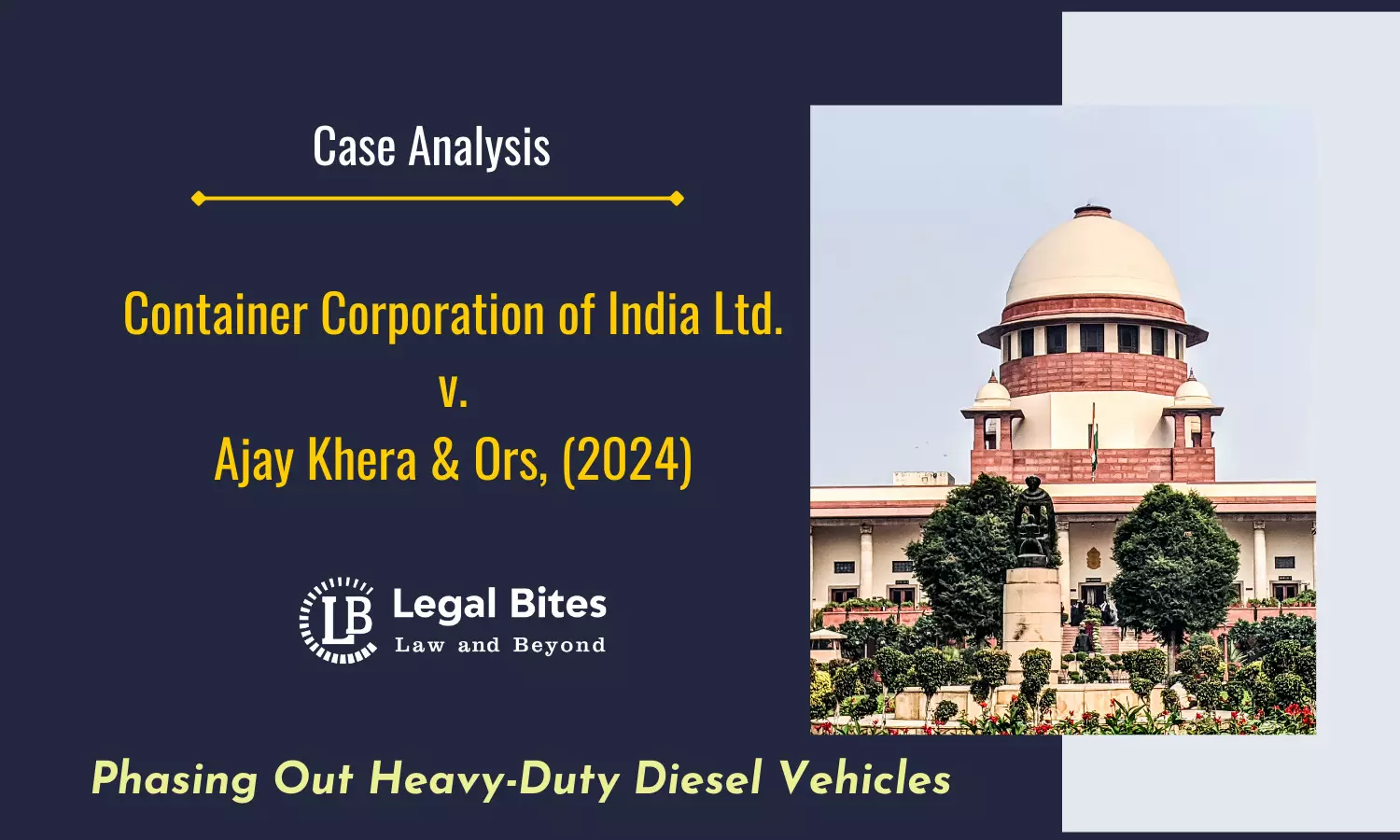Case Analysis: Container Corporation of India Ltd. v. Ajay Khera & Ors, (2024) | Phasing Out Heavy-Duty Diesel Vehicles
Review the significant case study emphasizing a pollution-free environment and mandating a policy for phasing out heavy-duty diesel vehicles

Review the significant case study emphasizing a pollution-free environment and mandating a policy for phasing out heavy-duty diesel vehicles
Case Title: Container Corporation of India Ltd. v. Ajay Khera and Ors.
Court: Supreme Court of India
Citation: Civil Appeal No. 3798 of 2019
Judges: Justice Abhay S. Oka and Justice Pankaj Mithal
Date of Judgment: 11th January 2024
Facts
A Former Executive Director of Central Warehousing filed an original application before the National Green Tribunal regarding rising pollution due to the Inland Container Depot (for short, ‘the said ICD’) at Tughlakabad. The application asserts that the specified ICD is used by trucks/trailers not designated for Delhi, but instead for transportation to and from locations outside of Delhi.
Respondent requested the National Green Tribunal to the appellant:
- to shift the operations of the said ICD at Tughlakabad which was not bound for Delhi to other locations
- to prohibit entry of containers/trailers at the said ICD which was not bound for Delhi
- Only to utilise CNG run/battery
The Container Corporation (appellant) highlighted that modification in the ICD's usage would cause an increase in cargo transportation by road from ports across India to Delhi and subsequently cause pollution due to longer distances covered by the trucks. NGT passed interim orders as per the need and suggested restrictions to the use of diesel vehicles especially in the context of satellite terminals.
The Supreme Court first put a hold on the NGT's order in the Tughlakabad ICD pollution case and recommended the Environmental Pollution (Prevention and Control) Authority (EPCA) to submit a report containing suggestions.
Issue
Whether the NGT's statement safeguards the right to a clean environment as a fundamental right under Article 21 of the Constitution.
Analysis
Judgment
The Supreme Court agreed that Inland Container Depots (ICDs) are important inland hubs for making it easier to handle containerized goods. In essence, ICDs bring the effectiveness of seaports to the interior, providing closeness, consolidation, more accessible customs procedures, and lower costs. With its established customs offices and rail links, the Tughlakabad ICD showed how vital these dry ports were to the area's transportation infrastructure.
Air pollution impacts negatively the fundamental rights of the citizens enshrined under Article 21 of the Constitution of India
Apex court said,
"The NGT while protecting/safeguarding the above fundamental right of the people of Delhi NCR cannot allow infringement of the same fundamental right of the citizens living outside Delhi NCR"
Environmental Pollution (Prevention and Control) Authority (EPCA): Report
- EPCA agreed that heavy-duty cars need cleaner fuels but also knew there were some problems with how things are now. They said that BS-VI diesel cars were much better than older models and should be used instead. The strategy should focus on replacing older diesel with BS-VI heavyduty diesel vehicles as they are substantially cleaner than BSIV. Recommendations included the use of cleaner sources like CNG, hybrids, and electricity.
Further, the Court directed that certain recommendations be put forward to prevent air pollution. Hence, the Court recognizes there should be a transition to cleaner fuels in Delhi.
Supreme Court Directives
In the Tughlakabad ICD pollution case, the Supreme Court replaced the NGT's instructions with new ones:
- Heavy-duty diesel vehicles will be gradually replaced with BS-VI vehicles. The Union of India needs to develop a program within six months.
- Better infrastructure for cleaner cars: The Ministry of Road Transport and Highways would look into CNG, hybrid, and electric fuel sources for heavy-duty vehicles.
- Optimizing ICDs around Delhi: Within six months, the Container Corporation would devise a plan to use nearby ICDs better and set up central labs close to them.
- Better parking management at Tughlakabad ICD: The Container Corporation would follow KPMG's February 2021 suggestions within six months.
These above steps are meant to reduce air pollution by switching to cleaner cars and improving logistics and ICD operations. This important decision significantly reduces pollution and improves how cargo is handled in the area.
Implementation Strategies for Pollution Reduction
The case is based on the Environment Pollution Control Authority's (EPCA) suggestions, which stress how important it is to quickly switch heavy-duty diesel vehicles to choices that are better for the environment, especially those that meet the Bharat Stage VI (BS-VI) emission standards. The Court agreed that alternative fuel technologies aren't perfect for long-distance travel and supported using BS-VI heavy-duty diesel vehicles as a cleaner short-term option.
The ruling stresses how technology is constantly improving and how important it is to keep looking for better fuel sources. The Court agreed that there needed to be a firm policy for getting rid of heavy-duty diesel vehicles. It also suggested that the Ministry of Road Transport and Highways develop and adopt such a policy within a specific time. The decision gives the ministry six months to build a complete plan for removing and replacing old cars with ones that meet BS-VI standards.
Along with dealing with car pollution, the ruling focuses on making the best use of ICDs in and around Delhi. The Court observed that only the ICDs at Tughlakabad and the ICDs at Rewari were working at 60% or more of their total capacity out of the seven sites in the area. This shows how important it is to have a complete plan to make sure that all the ICDs in the region are used in the best way possible, which would make the Tughlakabad centre less busy.
The ruling also talks about how Delhi has central laboratories, drug controller offices, and other similar places where imported goods can be tested in labs before customs clear them. The Court said that to fix the problem of facilities needing to be used more in other ICDs, they should work with approved agencies and labs to offer their services in ICDs outside of Delhi. This move aims to spread out testing centres and make the work more evenly distributed among the different ICDs.
The Supreme Court's ruling also discusses where trucks and trailers can park in the Tughlakabad ICD. Even though there is space for 940 trucks and trailers, the study said parking needed to be organized, which caused traffic and pollution. To fix this, the Court told the Container Corporation of India (CONCOR), which runs the ICD, to make a plan for improving parking lots by a specific date and work with other groups to ensure enough spots inside and outside the base.
The Court noticed a difference in how the rules about cargo handling capacities were being followed, even though the ICD had made progress regarding the number of TEUs (twenty-foot equivalent units) it managed. The decision stressed how important it was for user agencies to build safe, secure, and roomy spaces that match their expected capacities. It also called for a study of data related to how these rules were put into action.
The ruling summarizes the EPCA's suggestions and points out four critical areas that need attention:
- Switching to cleaner vehicles
- Making the best use of ICDs
- Expanding testing facilities
- Improving parking areas
It stresses how important it is to follow these suggestions by the due dates and promises to monitor progress regularly.
After being told to do so, both the Ministry of Road Transport and Highways and the appellant have decided to follow the suggestions. The Court's decision ends by setting up a monitoring system. A follow-up review is to ensure the planned measures are implemented on time and correctly.
Conclusion
Thus, the Court's decision is a complete and forward-looking plan to deal with environmental issues when moving and dealing with cargo. The Court wants to make a sustainable and effective system for moving things in the given area by combining rules for cleaner vehicles, the best use of facilities, and improvements to infrastructure. The result sets a standard for similar cases across the country and shows a willingness to take action to protect the environment and reduce pollution.
Click Here to Read the Complete Judgment

